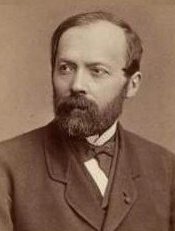Paul Eugene Bontu ( Fr. Paul Eugène Bontoux ) - French railway engineer, entrepreneur and financier; the main figure of the Union générale in Paris [2] .
| Paul Eugene Bont | |
|---|---|
| fr Paul Eugène Bontoux | |
 Paul Eugene Bontu (early 20th century) | |
| Date of Birth | |
| Place of Birth | |
| Date of death | |
| Place of death | |
| A country | |
| Occupation | engineer , entrepreneur, financier |
| Awards and prizes |
|
Biography
Paul Eugen Bonto was born on December 9, 1824 in the town of Ambrun .
He visited the Polytechnic School of the capital , and then entered the service in the management of railways. As a connoisseur of railway transport, he was soon invited to Austria , where he was almost immediately put in charge of the administration of the Southern Roads (Südbahn) [3] .
Already in France, Bonto undertook various speculations in which he acquired a lot of money, then again he lost everything; now, at a new high post, he became very close to the Rothschild house and took advantage of it for various scams. Thus, he built the Gatvan-Miskolc railway line in Hungary , founded the Sagrado silkmaker in Hertz, acquired Mariental slate mines near Presburg and established the Grad iron product factory near the South Road in 1875. In many ways, his efforts from Austria organized large-scale timber export to France [3] .
When Baron Hirsch began building the eastern railways, Bonto entered into an alliance with him. During the crisis of 1873, Paul Eugen Bonto lost most of his fortune and at the same time he broke up with Rothschild [3] .
In 1880, he was elected president of the Union générale Parisian banking house for legitimistic clerical purposes, and managed to raise the stock price from 125 francs to the fabulous number of 3,200 francs in the shortest possible time. At the same time, he entered into relations with the rulers of the Austrian Laender Bank and together with them acquired the Vushtagrad coal mines and took one concession from the Hungarian government to build the Budapest - Zemlin railway line, and another from the Serbian government to build the Belgrade - Niš line. But by the beginning of 1882, the Bontu Bank fell and on February 2, 1882 it was declared bankrupt [4] . Too risky operations failed, Union générale broke, and a criminal case was opened against him and other members of the board of this bank. Bontu was sentenced to 5 years in prison and fined 3,000 francs [4] , but managed to escape from France [3] .
Abroad in 1888 he wrote the work " L'Union generale ", in which Bontu tried to explain and justify his activities [2] . According to the Brockhaus and Efron Jewish Encyclopedia , Bontu tried to present the death of the bank as a separate episode of that fierce policy of conquest, which the Jew , according to him, leads against competing financial structures for a very long time. The victims of the collapse of the bank, the clergy and clerics , who were the main shareholders of the bank, took the book literally, which subsequently greatly contributed to the strengthening of anti-Semitism in France [4] .
Paul Eugen Bontu died in 1904 in the city of Cannes [2] .
Notes
- ↑ 1 2 Sycomore / Assemblée nationale
- ↑ 1 2 3 Bontu // The Brockhaus and Efron Small Encyclopedic Dictionary : 4 tons. - St. Petersburg. , 1907-1909.
- ↑ 1 2 3 4 Bontu, Eugen / / Encyclopedic Dictionary of Brockhaus and Efron : 86 t. (82 t. And 4 extra.). - SPb. , 1890-1907.
- ↑ 1 2 3 L. Sh. Bonto, Eugene // The Brockhaus and Efron Jewish Encyclopedia . - SPb. 1908-1913.
Literature
- L. Sh. Bontu, Eugene // The Jewish Encyclopedia of Brockhaus and Efron . - SPb. 1908-1913.
- Bontu, Eugene // Encyclopedic Dictionary of Brockhaus and Efron : 86 t. (82 t. And 4 extra.). - SPb. , 1890-1907.
- Grande Encyclopédie, T. VII, 359;
- Ε. Bontoux , L'Union Générale (1888).